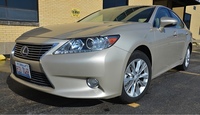2013 Lexus ES 300h A Luxury Hybrid Drive By Larry Nutson
2013 Lexus ES 300h
Luxury hybrid drive
By Larry Nutson
Senior Editor, New York Bureau
The Auto Channel
The Lexus ES has always delivered a comfortable, refined and luxurious ride for folks looking for plush accommodations while driving from place to place. The ES hasn’t been particularly sporty but this new redesign has pushed a bit in that direction. And with the price of gasoline and fuel economy the topic of conversation at nearly every social gathering these days, Lexus has brought its first ever four-cylinder to market that combines with electric motors and a battery pack in the configuration of a hybrid drive train.
 |
The EPA's combined rating for the ES 300h is 40mpg, with 40 city and 39 highway mpg ratings. The 268-horsepower 2013 Lexus ES 350 is rated at 24 mpg combined. That difference of 16mpg just might make the ES300h pay off. Lexus thinks that about one-quarter of ES 300 buyers will care enough to buy the hybrid. Doing the math, for example if you drive 12,000 miles a year you would use 200 gallons of gasoline less per year in the 300h. That’s $800 at $4 per gallon, so the ROI on the extra $2880 is in a little over 3.5 years. And, gas prices are trending up so return would be sooner.
There is only one fuel tank size on the ES 300h and ES 350 which is 17.2 gallons. So, there is also a time saving and convenience factor to consider due to fewer refueling stops, which is great for long trips. To accommodate the hybrid battery the trunk is a bit smaller at 12.1cuft versus 15.2 for the ES 350. Otherwise the two ES’s are the same.
 |
Both the ES 350 and ES 300h feature a Drive Mode selector. Normal mode provides a blend of performance and efficiency that is suited to everyday driving, while Eco mode favors fuel economy. Sport mode increases powertrain and steering responsiveness, and for the ES 300h, the IP changes from the hybrid power monitor to a tachometer. The ES 300h adds an EV mode which allows short distance drives, at reduced speed, using only the power from the hybrid battery pack.
The ES 350 is powered by a 3.5-liter V6 engine with Dual VVT-i that delivers 268 horsepower at 6,200 rpm and 248 lb.-ft. of peak torque at 4,700 mated to a six-speed sequential-shift automatic Electronically Controlled Transmission with intelligence (ECT-i). EPA mileage ratings are 21mpg city and 31mpg highway, with 24mpg combined that I mentioned previously. Take note here that hybrids are most beneficial in city driving…if you do mostly highway miles the financial return is not as good.
Lots of safety features are offered. An optional Blind Spot Monitor with Rear Cross Traffic Alert (RCTA) helps detect vehicles in side blind spots. The RCTA alerts the driver to rear cross traffic when backing out of a parking spot. Available Lane Departure Alert (LDA) is integrated with automatic high beam dimming technology. The available Pre-Collision System (PCS) uses sub-millimeter wave radar, designed to detect certain obstructions traveling ahead and prepare the vehicle for a potential collision. The ES features 10 airbags as standard equipment, including driver and front passenger knee, front and seat-mounted air bags, as well as rear seat-mounted side airbags and front and rear side curtain airbags. Whiplash Injury Lessening (WIL) front seats are designed to limit excessive head movement in certain rear-end collisions, helping to decrease the severity of whiplash-type injuries.
 |
All new Lexus vehicles come with a 48-month/50,000 mile basic limited warranty with roadside assistance for 48 months/unlimited miles. Powertrain and restraint system coverage is provided for 72 months/70,000 miles. Corrosion perforation protection is covered for 72 months, regardless of mileage. Hybrid-related components, including the HV battery, battery-control module, hybrid control module and inverter with converter, are covered for eight years/100,000 miles.
 |
By the way, Lexus ranked highest in vehicle dependability among all nameplates for a second consecutive year in the 2013 J.D. Power and Associates Vehicle Dependability Study (VDS).
© Larry Nutson



